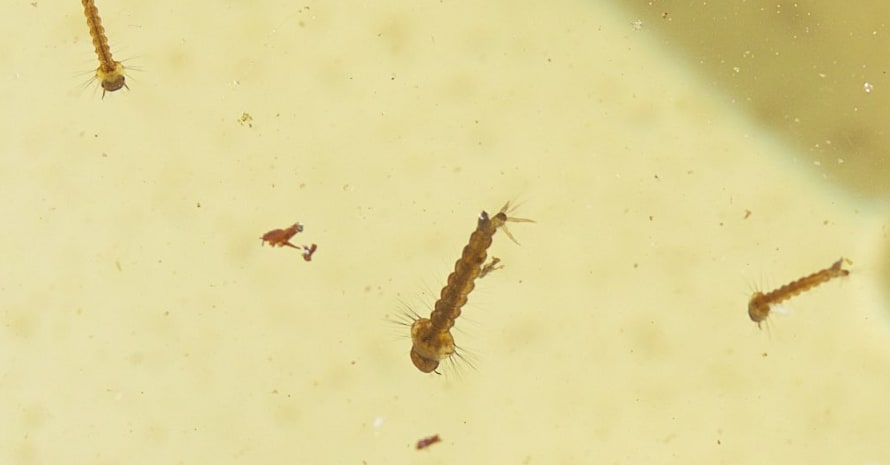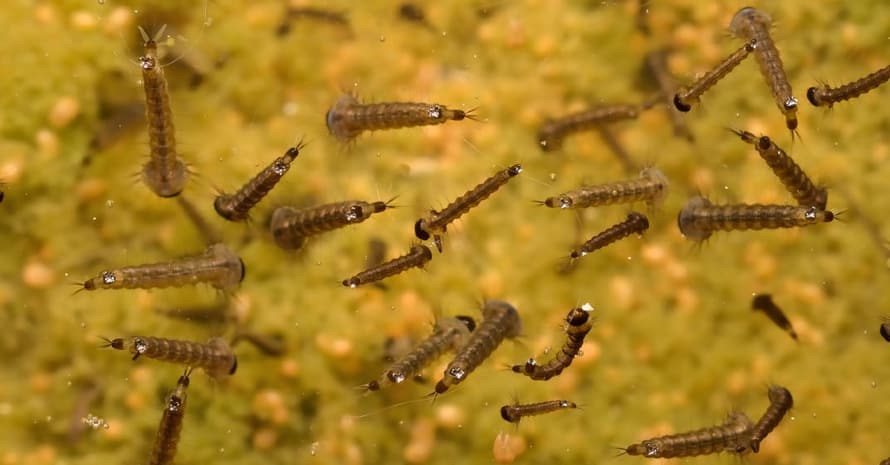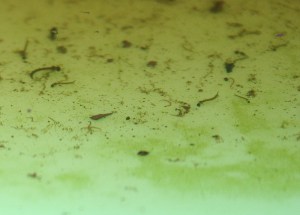Mozzies are speedy breeders that tend to lay their eggs in still water. They need very little water for reproduction, the tiniest puddle will do. The fragile larvae phase is the best period to eliminate the nasty blood-suckers before they even consider munching down on your yummy blood.
The best mosquito larvae prevention method is ensuring there’s no stagnant water around your home in the first place.
When you’re through with that task, there are a few more steps you might want to take to make sure the larvae is all dead and gone. I’m here to let you in on how to kill mosquito larvae, so read on.
[wpsm_titlebox title=”How to Kill Mosquito Larvae in Standing Water” style=”main”]
- Drain the standing water.
- If the water source has enough space – you can have fish.
- Make the Water Move.
- Add the garlic juice to the water.
- You can also add apple cider vinegar or cinnamon oil.
- Purchase a specialized soap that contains insecticides.
[/wpsm_titlebox]
Comprehensive Guide on Mosquito Larvae Killing

We all can’t stand mosquitoes, that’s a given. These flying vampires are a non-stop nuisance with their biting and blood-sucking behavior, not to mention the fact that they spread hazardous diseases (including malaria).
However, living in a mosquito-free world is an illusion, so we have to come up with the best way to control them. Now, before covering the details of what kills mosquito larvae, I will let you in on the very basic info on the topic.
What Are Mosquito Larvae?
Most of the time, mozzies prefer hanging out in the air, that’s a well-known fact. Baby mosquitoes, however, (also known as ‘larvae’ or ‘wigglers’) start their lives beneath the water surface. Mozzie babies (‘larvae’) represent one of the four different stages of mosquito life (egg-larvae-pupae-adult).
Where to Look for Mosquito Babies?
Adult mozzies lay their eggs on the water surface. These eggs hatch into larvae. Mosquito larvae resemble tiny worms that wriggle below the water surface, breathing through a siphon and feasting on various microorganisms in the water.
With all that being said, baby mozzies need still water for survival (mostly because there’s no fish looking to feast on them there). Mosquito larvae usually live underwater for up to two weeks, then start turning into pupae, and then transform into adult flying vampires all ready to suck your blood.
Also Read: Tiki Torch Fuel Against Mosquitoes
3 Effective Ways to Kill Mosquito Larvae
There’s more than one method to control baby mozzies. Generally speaking, the solution of your choice should be determined by the kind of still water you have around your home.
Every case is unique, so just browse through the scenarios described below to find that ideal natural mosquito larvae killer for you.
1. Start With Still Water
The most obvious and logical method of killing mosquito larvae in standing water is removing the water. These aquatic creatures won’t be able to survive without their breeding sites. They will not suffocate.
But they will most likely die without the food they tend to find in the water. In case your water bodies are challenging to remove (and i.e. this solution doesn’t suit your unique situation), read on.
2. Let Mosquito-Loving Fish Do the Job
Did you know that certain types of fish love munching on mosquito larvae? Yep, that’s true. So, if the water source you’re planning to free from mosquito babies has enough room and capabilities for housing fish, that’s your excellent answer to the ‘how to get rid of mosquito larvae in a pond or lake’ question. Baby mozzies present such an economical fish food solution!
3. Make the Water Move
Not always the most feasible solution, but still a good one. Mozzie babies are capable of surviving in still water. Even the tiniest fraction of motion can affect their wellbeing.
Therefore, if you have decorative water elements around your home, adding a waterfall (or providing another source of motion) would be a wonderful idea to keep the pesky blood-sucking insects (and their kids) at bay.

Home Remedies for Mosquito Larvae
Aside from the solutions listed above, there are other natural methods for mosquito larvae elimination and i.e. preventing mosquito breeding. Find them covered below.
Garlic Juice: Brings out Buffy the Vampire Slayer in You
There’s a popular belief that garlic (whether flowers, bulbs, cloves, or juice) repels vampires. The same goes for mozzies, these nasty flying blood-suckers.
So if you want to destroy baby mozzies that are developing in any standing water near your home, just mix the freshly extracted garlic juice with water and add the mixture where the wrigglers are about to transform into the adult blood-suckers. The garlic oil present in the garlic juice will suffocate the mosquito larvae, stopping them from invading your sweet home.
Also Read: Detailed Mosquito Misting System Reviews
Apple Cider Vinegar: Helps You Eradicate Mozzie Infants
This solution is all-natural and a breeze to take advantage of. Just combine 1 tsp of apple cider vinegar with about 128 oz of water and spray it where the wrigglers get ready for their metamorphosis.
This mixture gets the job done in a relatively speedy, chemical-free way. If this solution turns out to be too slow in your case, then give cinnamon oil a try.
Cinnamon Oil: Nothing but Beneficial
By coating the water surface, almost any kind of oil works great when it comes to eliminating (read as suffocating) mosquito babies. Cinnamon oil is particularly effective. Just make sure you don’t use oil where fish or other living organisms are present, for you will most likely eliminate them, too.
Overall, cinnamon oil excels in helping you ward off pesky wrigglers. It comes with certain pesticidal characteristics, yet it’s absolutely environmentally-friendly — and the scent is lovely.
[su_youtube url=”https://youtu.be/Zsapdzepof0″]
Soap & Baking Soda: Eliminate & Sanitize
Did you know that soap is very toxic when used against various insects? Yep, it’s true. The tiniest amount of dish soap in standing water is capable of killing all your baby mozzies within 24 hours maximum.
If your mozzie infestation has grown out of control, I recommend purchasing specialized soaps containing insecticides. Avoid using soap when dealing with mosquito larvae in a pool, though.
When it comes to baking soda, it won’t help you deal with wrigglers under its own steam. However, using baking soda is a great solution when it comes to disinfecting the containers that have been in contact with the nasty baby mozzies before. Just use a mixture of baking soda and vinegar for your disinfection purposes, then rinse with warm water.
Also Read: Most Effective Mosquito Repellents for Yard
Answering Your Frequently Asked Questions

Still have questions left about mosquitoes? Browse through the answers to my readers’ most frequently asked questions below. Perhaps, you will find the answer to the question you’re currently interested in there, too.
What do mosquito larvae look like?
Baby mozzies resemble semi-transparent worms with large heads and thoraxes. They are easy to notice because they hang just below the water surface for breathing purposes.
Their mouths have small brushes that assist them in filtering out small food particles needed for their nonstop nutrition. Each wriggler tends to shed its skin several times before reaching its pupal phase.
What kind of fish eat mosquito larvae?
The good news is that most aquarium and pond fish will find mozzie babies yummy. Mosquitofish, goldfish, guppies, koi, tilapia, minnows, and zebra danio are among them.
What are the ways to kill mosquito larvae?
Get rid of the water or keep it moving. Make the most of cinnamon oil and apple cider vinegar. Give soap a try. Alternatively, when mosquito larvae infestation is getting out of hand, you can always try solutions that contain pesticides.
What to put in standing water to kill mosquitoes?
Grab some dish soap or shampoo and add it to the standing water where baby mozzies hang. Any liquid soap will get the job done within just a few hours (up to 12). Just make sure you don’t use this stuff to get rid of wrigglers in a lake or pond.
Are these solutions eco-friendly?
Yes, most solutions described in today’s post are absolutely eco-friendly (dish soap and shampoo are exceptions). Bear in mind that anything that contains pesticides is potentially dangerous for the environment.
What happens if my pet accidentally eats wrigglers?
Nothing at all. Just consider it extra protein for your doggie (or kitty). Make sure you protect your pet from adult mozzies, though, for they carry a variety of dangerous diseases and can transmit them to your domestic animal.
Can mosquito larvae survive in cold temperatures?
Adult female mosquitoes usually have no problem surviving in cold temperatures. Some baby mozzies are capable of surviving throughout cold winter months, too. However, when it comes to enduring sudden temperature drops, mosquito larvae typically fail to make it. Great news for you, by the way!
Also Read: Mosquito Fogger Comparison
Cutting to the Chase: Take Action & Share Results!
Now that you’re aware of a multitude of mosquito larvae control options, you’re free to stick with the one that’s just right for you. Have you ever made attempts to eradicate mosquito babies? Which solution have you opted for out of the ones I’ve mentioned above? Was it a success?
Any practical advice for the homeowners that read my posts on a regular basis? You’re welcome to share your mozzie control experience with your fellow readers in the comment section below. Your feedback is immensely appreciated.
Also read:
- Are Mosquitoes Attracted to Light
- What Eats Mosquitoes
- When Are Mosquitoes Most Active
- Homemade Mosquito Trap
- Homemade DIY Mosquito Repellent
References:
- Preventing mosquito breeding (The Department of Health):
https://www1.health.gov.au/internet/publications/publishing.nsf/Content/ohp-enhealth-raintank-cnt-l~ohp-enhealth-raintank-cnt-l-5~ohp-enhealth-raintank-cnt-l-5.5 - About Mosquitoes (by Matthew Chmielewski, Biology graduate student, Clark University):
https://www2.clarku.edu/~tlivdahl/back/index.html - Mosquitoes: Practical Advice for Homeowners (By M. F. Potter, Lee Townsend, and F. W. Knapp, Entomologists University of Kentucky College of Agriculture):
https://entomology.ca.uky.edu/ef005

